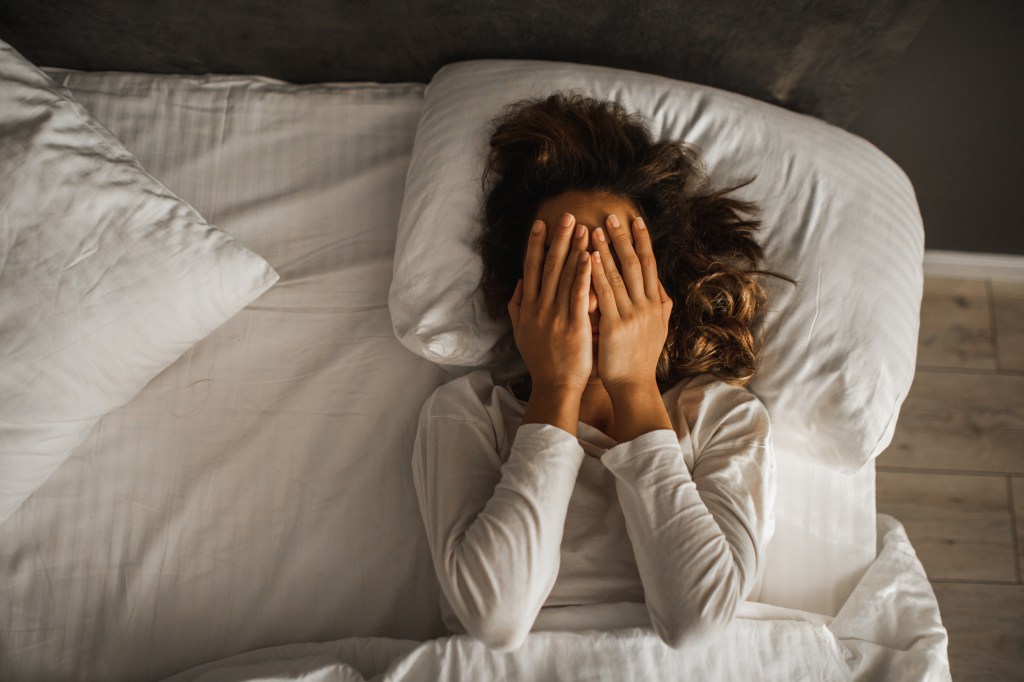Sleep is essential to our health. A laundry list of chronic and acute conditions and side effects, from type II diabetes to higher risk of car accidents, correlate back to—you guessed it—sleep. It’s hard to understate the importance of getting enough rest.

Yet, many people have a hard time with their sleep. Whether it’s waking up feeling unrested, or not sleeping enough to begin with, there are plenty of ways this seemingly simple part of your day can be thrown off track.
I’ve been writing about sleep and testing mattresses for years, and even I’m mystified by how hard it can be to sleep well. I spoke with experts from a variety of fields, from a nutritionist to a physical therapist, to find out their top tips for amazing sleep. Here’s what they said.
Make Sleep A Priority
It’s easy to deprioritize sleep, or procrastinate when trying to get to bed. Staying up a bit later to wrap up one last thing, or waking up a little earlier to get a head start on the day can seem like easy ways to gain back time that’s otherwise “lost” to sleep. “We often view sleep as that thing we have to do at the end of each day that just takes up a lot of time we could be using to do other things,” says Dr. Leah Irish, a researcher who studies psychology at North Dakota State University.
But it’s essential to treat your sleep as something important. “Choosing to make sleep a priority in your life means that we become much more purposeful and planful about our sleep habits,” Irish says. Instead of falling into bed after you’ve completed a day’s tasks, deliberately count backwards by seven or eight hours from your morning alarm to calculate when you actually need to go to sleep in order to get enough rest, she suggests. (The CDC recommends seven or more hours for adults.) This will help you make sure you’re sleeping enough, rather than delaying your bedtime in hopes of squeezing in one last thing.
Making sleep a priority also means thinking about other parts of your life that could be getting in the way of a quality night. Irish encourages “honest self reflection about the habits you may have that prevent you from falling asleep.” This is essential as what causes you to have difficulty can be drastically different from what keeps someone else awake at night. Exercising too close to bedtime could keep you up for hours, but for someone else it might be watching an intense TV show, Irish says.
By thinking about your behaviours, you can identify exactly what you need to avoid to make your sleep the best it can be. Treat this as an ongoing process—continue to self-reflect and make changes as needed. “If there is something about the routine that you are really not enjoying, find a way to modify your routine to increase your chances of success,” she says.
Once you’ve figured out what you want to change to improve your sleep, be sure you’re patient with yourself. “Know that changing many aspects of your behaviour all at once can be overwhelming and difficult to maintain,” Irish says. “Identify small steps you can take to adjust your routine more gradually.”
The key to prioritizing your sleep is to not worry about it too much, either. “An occasional night of suboptimal sleep is not the end of the world. Give yourself some grace and try again the next day,” Irish says.
Work With Your Circadian Rhythm And Chronotype
There are two forces that help regulate our sleep and wakefulness cycles, according to Dr. Christine Blume, a sleep scientist who researches light exposure, circadian rhythm and sleep at the Center for Chronobiology at the University of Basel in Switzerland. One component is a “homeostatic process,” which dictates that most adults need about eight hours of sleep following 16-hours of wakefulness. The other element is your circadian rhythm, which is what drives your body to wakefulness, Blume says. This rhythm, which repeats daily, takes place over the course of about 24 hours. It’s mainly informed by receptors in our eyes that sense light and communicate that information to the brain to help our bodies match the natural light-dark cycle, she says. The circadian process is also the basis of your “chronotype,” or your preferences for the timing of your sleep-wake cycle.
“You can fairly easily identify that by very simply thinking about your weekends. When do you go to sleep? When do you feel tired?” Blume suggests. Weekends and holidays can illuminate the timing of when “your batteries are replenished,” she says. If you’re really in sync with your chronotype, you will probably start to wake up without an alarm, she notes. This is a great starting point as “your holiday [or weekend] chronotype probably comes fairly close to your actual chronotype.”
If you have the flexibility to design your schedule around that, Blume encourages it. Though for many, it won’t be that easy. Fortunately, there are other approaches you can take.
Your circadian rhythm, which determines whether you’re more of a night owl or early bird, is largely genetic—but you can try to nudge your circadian rhythm through different day-to-day behaviours. Most people are “night owl-ish,” according to Blume, meaning their daily cycle is a bit longer than a 24-hour period. To be exact, “the average period length in healthy adults in very well-controlled studies has been identified to be 24.2 hours,” she says.
Night owls want to slightly compress their rhythm to better fit the modern world’s 24-hour days. For these folks, early light exposure is key. “That sort of speeds up the internal biological clock a little and makes the body think it is already later,” she says. As most people lean towards the night owl side of the spectrum, the common advice is to “seek morning light and avoid light in the evening,” Blume says.
If you’re a morning lark and tend to wake up earlier in the day (meaning your circadian rhythm is a bit shorter than the 24-hour day), you can prolong your circadian cycle through light exposure later in the day. “This slows down or delays the biological clock a little,” Blume says. “Through that, it’s able to synchronize with the 24-hour day again,” she explains. However, regardless of whether you’re more of a lark or an owl, you should avoid too much light in the evening, including from screens she says.
Pay Attention To Temperature

Unfortunately, you can’t control every aspect of sleep by timing your light exposure, hard work and mental fortitude. There are environmental factors you’ll want to optimize to make the most of your nightly rest and ensure your body has the conditions it needs for its best sleep. Temperature is one key factor for sleeping well.
“We have a sort of a natural temperature drop that happens,” says Dr. W Christopher Winter, a sleep specialist and researcher. This is part of what creates our drive to sleep, he says. The steepest drop in that temperature? That’s typically right when we go to bed, he explains.
The temperature of your surroundings at night also plays a role and can help support your body’s inherent dip in temperature. “There’s a lot of research that indicates that ambient temperature at night being relatively cool does facilitate sleep,” he says. He frequently asks people to consider dropping the temperature of their bedroom for a week or two and see how it affects their sleep. While there’s no single ideal temperature for everyone, Winter suggests keeping your bedroom between 65 and 68 degrees overnight.
In the morning, “our temperature naturally starts to rise about an hour or so before we wake up,” Winter says. He suggests supplementing that natural increase in temperature with exercise. It reinforces the change in temperature that your body has throughout the day.
Don’t Stress Too Much About Sleep Position
If you’ve read that one sleep position is better than another and you’re sweating bullets about how you like to slumber, don’t. “The body over its lifespan has naturally adapted its own way,” says Ben Fung, a physical therapist and spokesperson for the American Physical Therapy Association.
“Unless there’s a huge medical need, or a major medical contraindication that would encourage somebody to change their sleeping patterns and preferred positions, then I wouldn’t recommend for that change,” he says. In fact, “by changing what your body’s already optimized for, you might give yourself a [bad] night’s sleep,” he says.
Instead of trying to tinker with your preferences when it comes to sleep position, Fung suggests optimizing on top of them. “A pre-bed mobility routine, or a wake-up mobility routine [can be helpful],” he explains. These can include “mindfulness breathing exercises and stretches,” he says.
Fung draws on other cultures to explain why one position or way of sleeping isn’t inherently better than another. “Some cultures use really low mattresses, some use high mattresses, some do and don’t use pillows. And it’s not like we’re seeing an associated sudden boost or sudden decline in health because of this one factor,” he explains. “Health is usually many factors on top of one another.”
That’s not to say sleep position should never change. If you’re sleeping how you always have, but you’ve started consistently waking up in pain, you should consult your primary care provider or physical therapist about it, Fung says. In addition, sometimes acute injuries or changes to your body that come with things like pregnancy will require you to adopt a new position. But in general, unless changing your position is necessitated by something major, like hip replacement surgery, Fung suggests you sleep how your body likes to.
Mind What You Eat And Drink (And When You Do It)

What you eat and drink, and when you do it, can also impact your sleep. In fact, most people should avoid eating substantial meals within two or three hours of bedtime, according to Marie-Pierre St-Onge, a researcher at the Columbia University Institute of Human Nutrition. This is primarily due to how most of us sleep, which is lying down, she explains. “For some people [eating before bed can cause] more heartburn from gastric reflux,” St-Onge says.
She also suggests steering clear of certain types of meals before bed. “[Avoid] eating a large meal close to bedtime, very fatty meals and [food] high in sugar,” she says.
There are two liquids you’ll want to be extra cautious of: caffeine and alcohol. For both, the metabolization of the compounds can change your sleep for the worse. To make matters more complicated, the way your body processes these compounds can change over the course of your life.
“[One thing that’s] important to know about caffeinated beverages is that the impact on sleep varies across the lifespan,” St-Onge says. If there was a time when you could drink a latte late at night and still sleep well, that’s likely to change. “You process caffeine more quickly when you’re younger…[as you age] you start to metabolize the caffeine more slowly.” That means “it sticks around in your body for a longer period of time, and has the opportunity to influence your sleep a lot for a longer period,” she explains. To make the most of your sleep, she suggests paying attention to the effects caffeinated drinks have on your body and adjusting accordingly.
Also watch out for alcohol—initially, it helps you fall asleep because it’s a sedative, St-Onge says. “Once it’s metabolized and the effects wear off, your sleep becomes more disturbed throughout the rest of the night,” she explains. “You might fall asleep quickly and feel good for the first half of the night, but towards the second half of the night you have less restful sleep.”
Beyond watching what you eat and drink before bed, you can also consider how your overall diet affects your sleep, as diet plays a role in sleep quality. “Having a more healthful dietary pattern with more fruits and vegetables and a higher fibre diet; less fat, and saturated fat in particular, and having less sugar in the diet is associated with better sleep and lower risk of insomnia,” she says.
If Nothing Else Helps: Seek A Professional Opinion
Fung, Irish and Winter encourage people to seek professional opinions if their sleep is worsening, or if they’ve made decisions that should improve their sleep, but are seeing little-to-no effect.
“If you find that no matter what you do you can’t improve your sleep, seek advice from a clinician,” Irish suggests. Winter says to seek a professional opinion sooner than later, especially if you’ve gone an unusually long period of time without great sleep.
As a physical therapist, Fung’s suggestions for when to see care are more grounded in the physical experience of sleep. “If you find yourself going to sleep and you’re apprehensive about how you’re going to feel when you wake up, or if you wake up and you find that more often than would be acceptable you’re not waking up and feeling that fresh [it’s an indication to see a healthcare provider],” he says. “That’s the first kind of hint that there’s there’s less than optimal sleep.” He also suggests seeking care if something sudden, like an injury to your shoulder, happens.
When it comes to healthcare providers: There’s never a bad question. And when it comes to sleep, there’s never a bad time to start asking questions, either.
This story was first published on forbes.com and all figures are in USD.
Forbes Australia issue no.4 is out now. Tap here to secure your copy or become a member here.
Look back on the week that was with hand-picked articles from Australia and around the world. Sign up to the Forbes Australia newsletter here.


